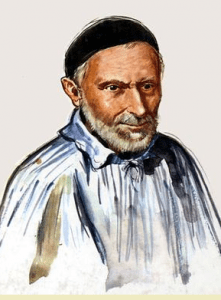 WWVD? We actually know the answer… thanks to a wonderful study done by David Carmona, CM (Spain) After pointing out the similarities between Vincent’s times and ours he presents excerpts from Vincent that show us what he actually did. At the end of the article he offers an examination of conscience on our response to the issues of today.
WWVD? We actually know the answer… thanks to a wonderful study done by David Carmona, CM (Spain) After pointing out the similarities between Vincent’s times and ours he presents excerpts from Vincent that show us what he actually did. At the end of the article he offers an examination of conscience on our response to the issues of today.
First, the following quotes from the article hint at the dire situations he faced and the rich nuances of Vincent’s response.
- “The poor who have survived this destruction are reduced to gleaning a few half-rotted grains of sprouted wheat or barley in the fields. They make bread from this, which is like mud and so unwholesome that almost all of them become sick from it.”
- “Vincent feared nothing and no one and showed himself to be a tireless artisan of peace.”
- “Vincent’s desires for peace did not lead him to take a position of blind pacifism. We see this especially in regard to his view of Islam.”
- “There are Christians in every area of the world and disciples of Saint Vincent on both sides of every form of barrier and on both sides of every wall and curtain.”
- “Like Saint Vincent, we, his disciples, ought to be concerned about defending the poor who long for peace in a more urgent way than those who are not poor because they, persons who are poor, are the first victims in all of these conflicts.”
- “The organization of relief for the victims of war is another significant example of Saint Vincent’s charity. We find in these relief efforts the great characteristics of his holiness and his genius.”
- “He knew how sensitize people to these realities and also knew how to appeal to their generosity.”
Vincent himself wrote.
- “We spent up to 22,000 livres on seed in one year, keeping them busy in the summer and feeding them in the winter. See, Ladies, the good works you have done!”
- “We felt it our duty to provide these people with the means of doing so by giving them axes, billhooks, and spinning wheels to put the men and women to work. In this way, they will no longer be dependent on anyone, if some other disaster occurs which could reduce them to the same wretched state. We have also distributed the seeds sent from Paris for this region.”
IV: Questions for Reflection and Dialogue:
Violence and insecurity form part of our daily life.
—the means of communication are proof of the above reality: some express a fear of war, others live in the midst of war and suffer as a result of war while still others seem to desire war or at least create an environment that is favorable toward war.
—what is your knowledge about the causes that create violence and war?
—the means of communication show us war “in living color” and we have become accustomed to seeing and then forgetting. Who today remembers the Kurds, the Hutus and the Tutsis, the Chechens.
—what is your personal reaction when confronted with a situation of violence?
Blessed are the peacemakers
—How do I behave toward individuals who are foreigners, immigrants?
—How do I behave toward those who think differently than I do … am I tolerant and do I seek to enter into dialogue with such individuals?
—Do I forgive those who have wronged me?
—Do I embrace the future?
Various NGO’s and individuals seek to know and understand the root causes of conflict and thus commit themselves to the transformation of our world.
—Am I sensitive to the reality of violence and do I attempt to sensitize others?
––Do I participate with other groups and/or individuals in trying to know and understand the root causes of violence?
––In what ways can I commit myself to the cause of peace?
The full text in English can be found in the Vincentian Encyclopedia.
The original article in three parts can be found on SOMOS a very rich Spanish language site
Image of Vincent courtesy of the Vincent de Paul Image Archive at de Paul
See also Vincent and War Relief by Richard Kehoe, CM
Tags: peace, Vincent, violence
